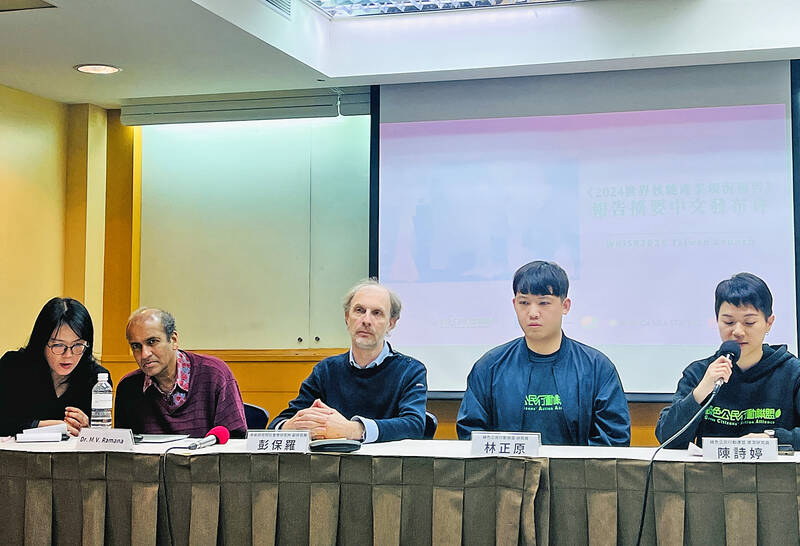Taiwan has adopted an energy policy of accumulation of sources instead of a transition from fossil fuels to renewable sources, the Green Citizens’ Action Alliance said yesterday, citing last year’s World Nuclear Industry Status Report.
Ambiguous statements on the phase-out of nuclear power and adjustments to energy policies paint a highly uncertain future for Taiwan’s nuclear energy development, said Paul Jobin, an Academia Sinica Institute of Sociology associate research fellow who was a contributing author to the report, which was published in September last year, with the alliance releasing a Chinese translation yesterday.
President William Lai (賴清德) “made a pledge to carry on [former president] Tsai Ing-wen’s [蔡英文] energy policy,” the report said. “Thus far, Lai’s government has been characterized by an ambivalent attitude, which can be understood as a tactical move rather than a policy change.”

Photo: Chen Chia-yi, Taipei Times
“Premier [Cho] Jung-tai [卓榮泰] ... reaffirmed that the new government has no plans to extend the [operations of the Ma-anshan Nuclear Power Plant in Pingtung County]... However, he has also indicated the government’s openness to ‘new nuclear power,’” it said.
Until a significant boost in 2022, the development of renewable energy in Taiwan had been slow, the report said.
“Per capita energy consumption has hardly gone down over the past decade, and per capita electricity consumption has increased by 14 percent over the decade 2013-2022 and decreased only slightly, by 1.2 percent, in 2023,” the report said, adding that the trend continued in 2023.
However, over the past two decades, electricity generated from liquefied natural gas shot up from less than 20 terawatt-hours (TWh) in 2000 to 111.6TWh in 2023, making up 39.5 percent of total electricity generation, close to the 42.2 percent share of coal-fired electricity, it said.
The government’s strategy has been to “promote green energy, increase natural gas, reduce coal-fired power and achieve nuclear-free,” implying a substantial increase in natural gas consumption, which would provide half of gross electricity production by this year, the report said, citing the Ministry of Economic Affairs.
While the Lai administration is expected to follow in the preceding administration’s footsteps regarding the energy transition, national and international political tensions might make implementation more challenging, it said.
Another contributing author weighed in on Taiwan’s potential use of small modular reactors (SMRs) — advanced nuclear reactors, typically with a power capacity of up to 300 megawatts.
M.V. Ramana, Simons Chair in Disarmament, Global and Human Security at the University of British Columbia’s School of Public Policy and Global Affairs, told the Central News Agency that the greatest issues with developing SMRs in Taiwan are risk factors and overhead costs.
If Taiwanese industry considered the development of SMRs, or other nuclear power technologies, to solve power demand issues due to the rise of artificial intelligence, it would delay the implementation of a renewable policy, Ramana said.
The high costs of SMRs and the time required to develop them do not translate into economic benefits, he said.
The alliance said that Taiwan’s energy structure needs to be adjusted to reduce its dependence on imported fossil fuels and achieve energy self-sufficiency.
Taiwan’s nuclear energy development faces political and economic challenges, so balancing the non-nuclear homeland policy and energy security needs to be resolved, it said.

‘FORM OF PROTEST’: The German Institute Taipei said it was ‘shocked’ to see Nazi symbolism used in connection with political aims as it condemned the incident Sung Chien-liang (宋建樑), who led efforts to recall Democratic Progressive Party (DPP) Legislator Lee Kun-cheng (李坤城), was released on bail of NT$80,000 yesterday amid an outcry over a Nazi armband he wore to questioning the night before. Sung arrived at the New Taipei City District Prosecutors’ Office for questioning in a recall petition forgery case on Tuesday night wearing a red armband bearing a swastika, carrying a copy of Adolf Hitler’s Mein Kampf and giving a Nazi salute. Sung left the building at 1:15am without the armband and apparently covering the book with a coat. This is a serious international scandal and Chinese

PERSONAL DATA: The implicated KMT members allegedly compiled their petitions by copying names from party lists without the consent of the people concerned Judicial authorities searched six locations yesterday and questioned six people, including one elderly Chinese Nationalist Party (KMT) member and five KMT Youth League associates, about alleged signature forgery and fraud relating to their recall efforts against two Democratic Progressive Party (DPP) legislators. After launching a probe into alleged signature forgery and related fraud in the KMT’s recall effort, prosecutors received a number of complaints, including about one petition that had 1,748 signatures of voters whose family members said they had already passed away, and also voters who said they did not approve the use of their name, Taipei Deputy Chief Prosecutor

UNDER ATTACK: Raymond Greene said there were 412 billion malicious threats in the Asia-Pacific region in the first half of 2023, with 55 percent targeting Taiwan Taiwan not only faces military intimidation from China, but is also on the front line of global cybersecurity threats, and it is taking action to counter those attacks, President William Lai (賴清德) said yesterday. Speaking at the opening of this year’s Cybersec Expo in Taipei, the president assured foreign diplomats and exhibitors that Taiwan remained committed to strengthening its defense against cyberattacks and enhancing the resilience of its digital infrastructure. Lai referenced a report from the National Security Bureau (NSB) indicating that the Government Service Network faced an average of 2.4 million intrusion attempts daily last year, more than double the figure

Retired US general Robert B. Abrams reportedly served as adviser to Chief of the General Staff Admiral Mei Chia-shu (梅家樹) during the Ministry of National Defense’s computer-simulated war games in the buildup to this year’s 41st annual Han Kuang military exercises, local media reported yesterday. For 14 days and 13 nights starting on April 5 and ending yesterday, the armed forces conducted the computer-simulated war games component of the Han Kuang exercises, utilizing the joint theater-level simulation system (JTLS). Using the JTLS, the exercise simulated a continuous 24-hour confrontation based on scenarios such as “gray zone” incursions and the Chinese People’s Liberation